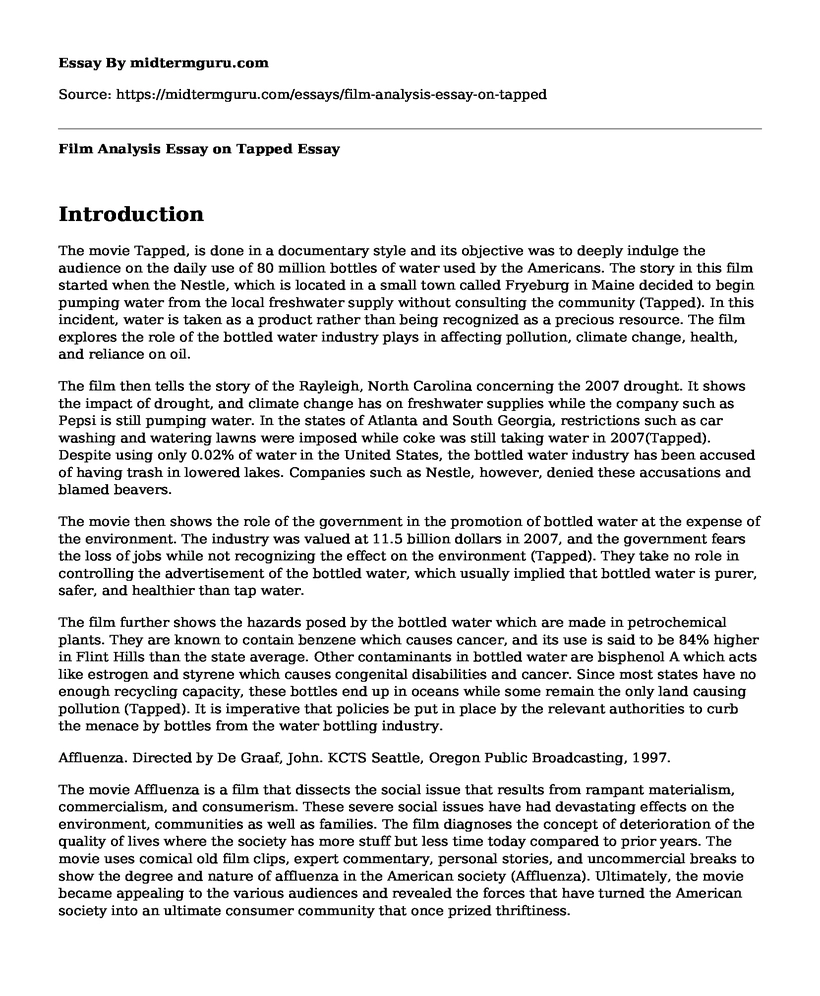Introduction
The movie Tapped, is done in a documentary style and its objective was to deeply indulge the audience on the daily use of 80 million bottles of water used by the Americans. The story in this film started when the Nestle, which is located in a small town called Fryeburg in Maine decided to begin pumping water from the local freshwater supply without consulting the community (Tapped). In this incident, water is taken as a product rather than being recognized as a precious resource. The film explores the role of the bottled water industry plays in affecting pollution, climate change, health, and reliance on oil.
The film then tells the story of the Rayleigh, North Carolina concerning the 2007 drought. It shows the impact of drought, and climate change has on freshwater supplies while the company such as Pepsi is still pumping water. In the states of Atlanta and South Georgia, restrictions such as car washing and watering lawns were imposed while coke was still taking water in 2007(Tapped). Despite using only 0.02% of water in the United States, the bottled water industry has been accused of having trash in lowered lakes. Companies such as Nestle, however, denied these accusations and blamed beavers.
The movie then shows the role of the government in the promotion of bottled water at the expense of the environment. The industry was valued at 11.5 billion dollars in 2007, and the government fears the loss of jobs while not recognizing the effect on the environment (Tapped). They take no role in controlling the advertisement of the bottled water, which usually implied that bottled water is purer, safer, and healthier than tap water.
The film further shows the hazards posed by the bottled water which are made in petrochemical plants. They are known to contain benzene which causes cancer, and its use is said to be 84% higher in Flint Hills than the state average. Other contaminants in bottled water are bisphenol A which acts like estrogen and styrene which causes congenital disabilities and cancer. Since most states have no enough recycling capacity, these bottles end up in oceans while some remain the only land causing pollution (Tapped). It is imperative that policies be put in place by the relevant authorities to curb the menace by bottles from the water bottling industry.
Affluenza. Directed by De Graaf, John. KCTS Seattle, Oregon Public Broadcasting, 1997.
The movie Affluenza is a film that dissects the social issue that results from rampant materialism, commercialism, and consumerism. These severe social issues have had devastating effects on the environment, communities as well as families. The film diagnoses the concept of deterioration of the quality of lives where the society has more stuff but less time today compared to prior years. The movie uses comical old film clips, expert commentary, personal stories, and uncommercial breaks to show the degree and nature of affluenza in the American society (Affluenza). Ultimately, the movie became appealing to the various audiences and revealed the forces that have turned the American society into an ultimate consumer community that once prized thriftiness.
The documentary shows the effects of the affluenza among the population such as stress, for example, through the personal story of Gerald Celeste, an author of Trends 200o who claims he has no life. He explains his usual of waking up, going to work and going and still facing a lot of bills every day. By using such cases, the documentary shows the extent to which affluenza has spread in the society. It shows the difference in the number of people who own accessories such as colored television and dishwashers compared to the previous years (Affluenza). The film dissected the impacts of advertisement on products and giving the audience a unique understanding of a good life.
Conclusion
The movie ends with a prescription on how to tackle affluenza through spending less money, stronger family communication, and shorter working hours. The movie helps one realize the concept of affluenza in our society is not accidental and its existence cannot be denied (Affluenza). Therefore, less shopping and working as well as spending more time with family and friends can help increase the joy in our lives.
Works Cited
Affluenza. Directed by De Graaf, John. KCTS Seattle, Oregon Public Broadcasting, 1997.
Tapped. Directed bySoechtig Stephanie, and Jason Lindsey. Atlas Films (III), 2009.
Cite this page
Film Analysis Essay on Tapped. (2022, Aug 17). Retrieved from https://midtermguru.com/essays/film-analysis-essay-on-tapped
If you are the original author of this essay and no longer wish to have it published on the midtermguru.com website, please click below to request its removal:
- Extended Definition of Good Writing - Paper Example
- The List of Websites About Guitars
- The Law and Media - Paper Example
- Essay on Islamic Art and Architecture
- Essay Sample on War Films
- National Spelling Bee: Heartbreaking and Inspiring - Essay Sample
- Social Media and Healthcare Decisions: Exploring the Influence - Research Paper







